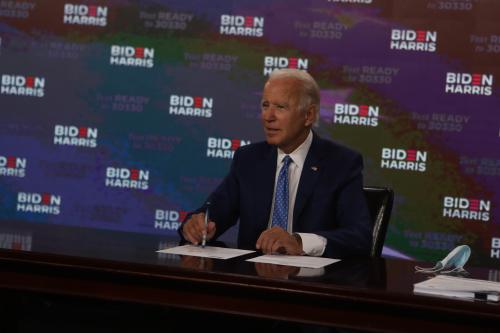Movements and politicians claiming the mantles of populism and nationalism have risen to prominence in democracies around the globe, including in Israel and the United States. As experts discussed at a Brookings event on October 7, both countries have seen dramatic challenges to existing norms in recent years as part of ongoing political turmoil, and both share important characteristics with other democracies around the world.
Director of Brookings’s Center for Middle East Policy Natan Sachs opened by asking each of the panelists to find the best case argument for three often troublesome concepts in these debates: nationalism, populism, and majoritarianism. Israeli political theorist Yael (Yuli) Tamir described what she saw as the good side of nationalism. Tamir argued that political communities that can produce cultural and historical connections that create a sense of solidarity are necessary for the success of modern states. While the mantle of nationalism may be abused for chauvinism, there is countervailing danger: Societies often take national identity for granted, she noted, forgetting how important nationalism is.
According to Tamir, recent expressions of nationalism are unique because they stem from the bottom up, while in the past, the elite would have introduced nationalism to recruit the masses. Now, perhaps for the first time in history, Tamir contended, a demand to put one’s own country first is emerging from the people. Sachs asked how her understanding of nationalism differs from that of the conservative philosopher Yoram Hazony or Trump’s former chief strategist, Steve Bannon; she argued that nationalism has various strands and could also be used by progressive politicians for liberal ends.
William Galston, the Ezra K. Zilkha Chair and senior fellow in Governance Studies at Brooking and author of Anti-Pluralism: The Populist Threat to Liberal Democracy, then offered two defenses of populism, despite the fact that it also poses a threat to pluralism and the liberal strand of liberal democracy through majoritarianism. First, there have been important failures at the elite level in many democracies, including surrounding the 2008 financial crisis, during more recent waves of immigration, and on certain foreign policy issues. Populism highlights these failures and challenges elites to correct them. Second, the rise of populism signals a failure of representation, which has left many voters feeling unheard and disrespected. Populism again might help correct this.
Shany Mor, associate fellow with the Hannah Arendt Center at Bard College, argued that there can be a silver lining to majoritarianism as well: it allows for accountability that is often lacking in systems with many checks and balances. In the case of Brexit, for example, Mor argued that it will be increasingly associated with an individual — Boris Johnson — and he will be held accountable for its successes or failures. Mor asserted that in democratic politics, it is vital to be able to make mistakes and collectively learn from them.
Conversation then turned to the policy implications of nationalism, as in the immigration debate and the role of courts, before the event concluded with questions from the audience.



Commentary
Highlights: Experts discuss the tensions between populist, nationalist, and democratic impulses
December 10, 2019